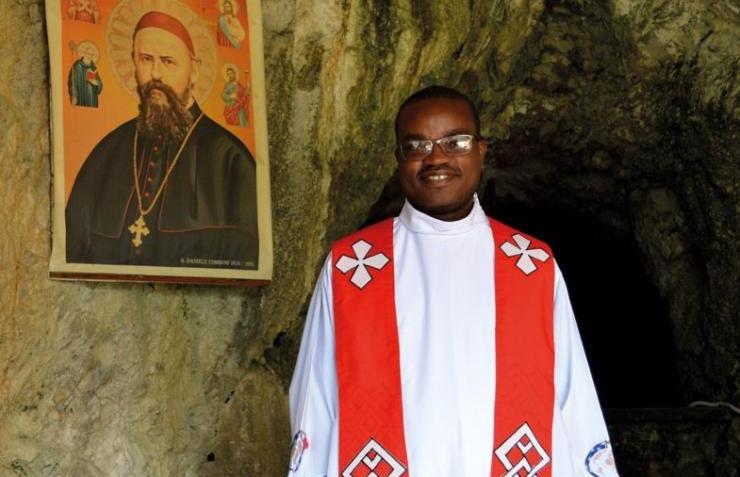A simple sign of the cross leads him to discover God’s call in his life. Fr. Raoul Sohouénou Cakpo Edènan, Comboni Missionary from Benin, talks about it.
I was born in 1981 in Cové 159 kilometres from the Beninese capital, Cotonou. I am the sixth of 14 brothers and sisters. I was born into a polygamous family of voodoo culture and I grew up with my paternal grandparents. One day, my grandfather got sick and thought maybe he was going to die, so he asked to be baptized. I was six years old then and I didn’t understand a thing when I saw him make the sign of the cross for the first time. Luckily my grandfather recovered, but he continued to make the sign of the cross.
I was steeped in voodoo culture and believed that the cross sign was part of the voodoo religion. Since I liked it, I started making it myself. On the weekends my father came to visit us. One day when he was talking to my grandfather, I heard them mention the possibility that my brothers and I could start going to “catechism”. I memorized that word and ran to where my older sister was to have her explain what “catechism” was. I well remember what she replied: “If we go, we too can make the sign of the cross like grandfather makes before eating”. The following Saturday, my brothers and I started going to catechism.
As I got older, I thought about what I wanted to be when I grew up. My greatest wish was to become a mechanic. My father was a farmer and I thought that this way I could help him fix his ploughs when they broke. However, after my baptism and first communion, when asked the same question, I said I wanted to be a priest. My answer was conditioned by the impression he made on me from the life and example of the pastor of the parish that I frequented together with my brothers and sisters.
One day I spoke about it with my father who was happy at first but when the time came to enroll in the diocesan minor seminary, he was strongly opposed to it and this lasted five long years. Fortunately, with time and seeing my determination, he ended up accepting it and even encouraging me in my choice.
In 2001, I met the Comboni Missionaries in Cotonou, during an ordination Mass and I was attracted by the motto “Africa or death” of St. Daniel Comboni. I had studied the history of the slave trade in school and did not understand how a 19th-century European could love Africans so much. I understood then that by following the Comboni charism I could reach Christ. After a period of discernment, I began my postulancy in Togo. It was my first contact with another culture, even though Togo and Benin are two neighbouring countries.
In any case, I received a lot of help from my formators and peers to overcome difficulties. The Lord has always placed in my path formators who knew how to walk with me, at my pace, accepting my slowness and my failings. Furthermore, I love community life and walking with other young people is also a call to the love of Christ. I also appreciated my studies, which allowed me to deepen my faith, and the entire formative itinerary with the Comboni Missionaries, which offers a precious means of human, spiritual and missionary maturation.
I followed the Comboni formative process including the postulancy and the novitiate, taking my vows in May 2009. I studied theology in Italy and in 2014, I was ordained a priest in my parish in Benin. Immediately afterward I was sent as parish curate to Cotonou, in the parish where I had known the Comboni Missionaries. The Lord has made me return to the source of my vocation. I was there for five beautiful years in which I lived everything with joy: accompanying the catechists, the young aspirants, the sick, the elderly… I was also involved in the animation of the Missionary Childhood group.
In 2019, I arrived in Italy where I am working with youth and vocation ministry. Some of the young people I accompany have had missionary experience in Africa and have seen that in our continent the Church is more dynamic, more involved and with more young people than the Churches in Europe. They tell me: «We know that it is not easy to be a missionary in Europe, but we need you. Persist and carry on”.
It is true that it is difficult to get in touch with young people in a secularized society like that of Europe, but I am happy. I meet many young people who want to deepen their faith and live it in an authentic and concrete way. I see the enthusiasm of many young people sensitive to questions related to justice, peace or ecology. A final thought comes to me and I often think of the many missionaries who have left Europe for Africa and I think that young Europeans must renew their missionary zeal. Perhaps it is a way to honour those courageous missionaries of the past.






